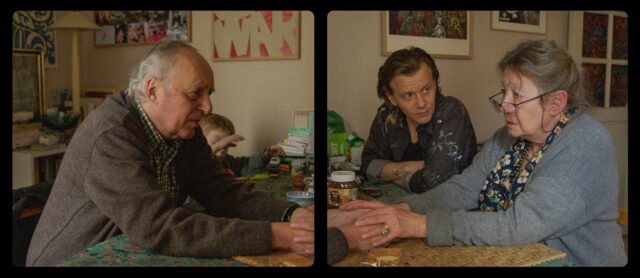Vortex: Anticlimax, by David Bax

Unlike his last feature to be released in the U.S., 2018’s Climax (2019’s Lux Æterna is finally getting its debut here this weekend), which placed them right in the middle of the movie, Gaspar Noé‘s Vortex puts the entirety of the credits right up at the beginning of the picture. Enjoy that because it’s the only example of instant gratification the film is going to give you. Vortex uses its hefty length to dwell in the moments that actually make up most of our lives (or end-of-lives in this case). While Noé’s previous work has given him a reputation for shock, this might in fact be his most unsettling–and most plainly beautiful–effort so far.
That’s not to say that Vortex is completely restrained or–shudder to think–conventional. Noé does have one major formal gambit up his sleeve. After a brief prologue, the rest of the movie unfolds in split screen, the scope frame divided into two rounded-off boxes of equal size, each following one half of an elderly couple, Lui and Elle (Dario Argento and Françoise Lebrun), as they pass the days in the same Paris apartment in which they’ve clearly spent the last decades.
Often, the two cross paths or simply sit in the same room together, sometimes in the company of their son, Stéphane (Alex Lutz). In these cases, the image almost lines up into a master shot of sorts that includes both of them. But the black bar separating the two frames isn’t the only thing keeping them apart. The eyelines never quite match up and sometimes Stéphane awkwardly occupies non-matching parts of both shots at once. Noé uses these conspicuous “errors” in framing (as well as a soft touch in editing that guides our gaze back and forth between the two halves of the screen) to reflect the inharmoniousness of Elle and Lui’s relationship. Elle is suffering from dementia and the growing gulf between their psychological presence in one another’s lives is as frustrating to them as it is heartbreaking.
In addition to Noé and cinematographer Benoît Debie, commendations are in order for the team of production designer Jean Rabasse, art director Anna Prat and set decorator Nathalie Roubaud. The apartment is as indelible a location as any film has ever had, stocked floor to ceiling with books that overflow the shelves and pile up on the floor to eventually become shelves themselves, a visual history of lives enriched by the written word. But it’s also an unmanageable clutter, as hard to navigate at Elle’s own thoughts and a reminder that all the brain-sharpening a lifetime of reading can do won’t forestall the deterioration of a disease-ridden mind.
There will be those who claim, based on superficial evidence, that this film is a major departure for Noé. But what has always made his work so emotionally challenging has less to do with outré occurrences and more to do with a deep empathy for human suffering. Vortex may be more intimate but that’s what makes it especially wrenching. It’s the feel-bad movie of the year so far, which means it’s another triumph for Noé.



























